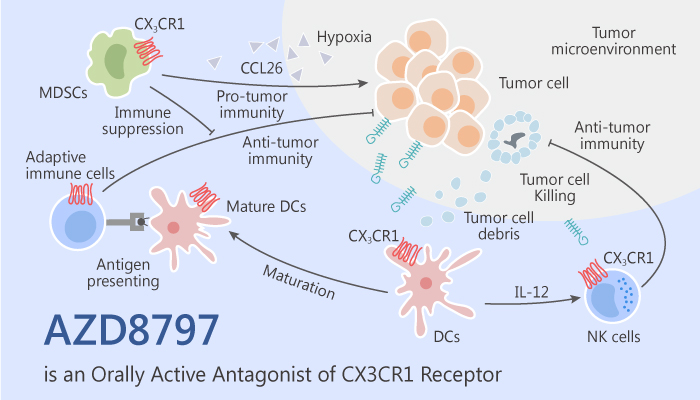Multiple sclerosis is a demyelinating disease with damaged insulating covers of nerve cells in the brain and spinal cord. It is a kind of inflammatory disease, affects the central nervous system (CNS).
EAE (Experimental autoimmune encephalomyelitis) is an experimental animal model of brain inflammation. It is similar to multiple sclerosis, also an inflammatory demyelinating disease of the CNS.
CX3CR1 belongs to the chemokine receptor family. The receptor also plays an important role in multiple sclerosis and EAE. It involves in leukocyte adhesion and migration. Thus, CX3CR1 becomes a target in the research of multiple sclerosis.
AZD8797 is a highly selective CX3CR1 inhibitor. It binds to human and rat CX3CR1 with high affinity. The Ki values are 4 nM and 7 nM, respectively. What’s more, AZD8797 shows 246- and 187-fold selectivity over hCCR1 and hCCR2. Besides, it shows no obvious effect on CCR4, CCR5, CCR6, CXCR3 or CXCR5.

On one hand, AZD8797 also displays excellent bioactivities. It exhibits great oral bioavailability. In addition, AZD8797 (81.8 µmol/kg) reduces translocator protein (TSPO) binding via daily oral administration in EAE rats.
On the other hand, AZD8797 (32 or 64 μmol/kg) dose-dependently prevents development of relapses and all histopathological manifestations of the disease.
AZD8797 is a potent, highly selective, orally active and allosteric non-competitive CX3CR1 inhibitor. It exhibits excellent activity in experimental autoimmune encephalomyelitis. AZD8797 deserves further exploration in the treatment of multiple sclerosis.
References:
1. Ridderstad Wollberg A, et al. Proc Natl Acad Sci U S A. 2014 Apr 8;111(14):5409-14.